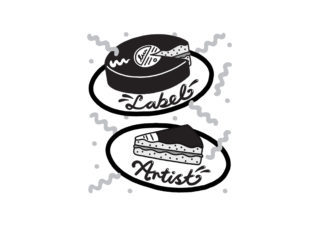Lessons in signing a big fat record deal
Why is it so easy to fuck it up?

Why is it so easy to fuck it up?
You should never let a lawyer loose in a recording studio – the results would be awful, boring, or awfully boring. If you want proof, listen to the work of Julio Iglesias, music’s most notable qualified lawyer. Nor should you ever let a musician work on an important contract.
Many musicians think that just because they sing and play at the same time they must also be a legal genius, though. This is rather like thinking that because you’re good at rugby you must also be funny (Matt Dawson) or that because you have a large bottom you must also be interesting (Kim Kardashian). As a result, there are thousands of bad record deals in history. But what exactly is a record deal, and why is it so easy to fuck it up? Essentially, a record contract allows someone (the label) to sell music created by someone else (the artist or band). That sounds nice and simple – like letting an estate agent sell your house – but can end up with unexpected demands, like when an estate agent goes rouge and sells not only your house but also your children.
For example, the label might ask you to hand over the copyright for your songs. That seems reasonable – they will, after all, be releasing your music – until you realise that they now have total control over what happens to your songs for the rest of your life; in fact, until 70 years after your death, which means they’ll be screwing you even when you’re dead.
Worse, they may ask for a 360-degree deal. This means the label takes a cut of everything you do, from publishing (your song is played on the radio), to licensing (your song is used in a movie), to merchandising (your lyrics are printed on toilet paper). It’s worse than being screwed when you’re dead because a.) you’re not dead, and b.) it’s 360-degree, so… y’know… you’re screwed from all sides.
There’s a good reason why labels do this. Most songs don’t make much money, so the one-sided nature of the deal reflects the risk the label is taking by investing in the artist. This feels wrong because the transaction involves art, but think of it like this: would a bank give you a big loan to build a house just because your design looks nice? Of course not. The same goes for a label – they’re not going to give you a great big loan (your advance) just because your music is amazing.
Still, there’s protecting against risk and then there’s being a dick. Let’s take a look at some famous deals that fall into the latter category.
We’ll start in the ’50s, a time when musicians and songwriters were treated with the same contempt as present day traffic wardens. Even by those shitty standards Little Richard got a bad deal, when he was asked to sign over the rights for his song ‘Tutti Frutti’ for $50. In return, he’d receive 0.5¢ per record sold (about a quarter of the usual rate back then). As a result, although the record sold over three million copies, Richard’s take was just $15,000.
You’ve also got to watch out for unscrupulous managers and their contracts. Badfinger signed with Stan Polley in 1970 and all was well at first (he got them a record deal with Warner Bros, although most of that money went to Polley). Eventually Warner dropped the band, citing Polley’s shady behaviour. Badfinger never recovered and frontman Pete Ham took his own life, leaving the message, “Stan Polley is a soulless bastard.”
Move forward to the ’80s and the exploitation continued. Despite being the decade’s demigods, both Michael Jackson and Prince managed to sign things they shouldn’t have. As a result, Prince turned himself from a sex icon into an unpronounceable symbol, while Jackson later said: “The recording companies really conspire against the artists – they steal, they cheat, they do everything they can.”
Rappers in particular have a penchant for signing bad deals, perhaps not surprising given the genre’s obsession with wealth. Take Dr Dre: no one is going to argue that a man who can successfully sell £10 headphones for £250 is bad at business. But even he got his pants pulled down as part of N.W.A., thanks a contract with the appropriately named Ruthless Records (co-owned by N.W.A.’s Eazy-E). Dre learnt from his mistake and went on to found Death Row Records, a label renowned for its ability to extract cash from wide-eyed artists.
What’s the lesson from all this? Not ‘read the small print’, because that’s boring. No, the lesson is to accept your own limitations and ask other people for help. That’s not very rock’n’roll, but it will save you a 360-degree shafting. And, in 2018, that’s the best most of us can hope for.